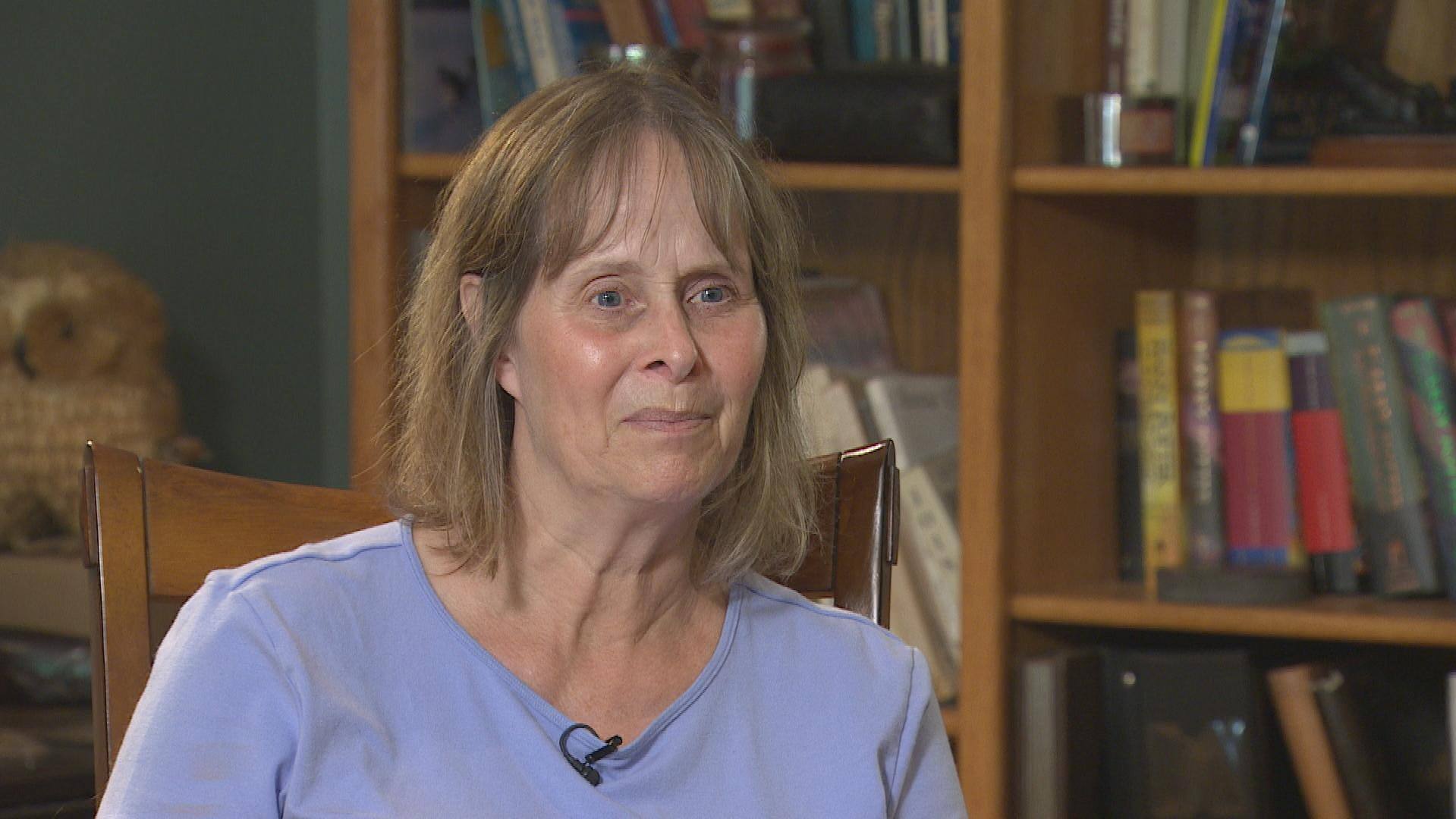Unlike urban firefighters, those who battle wildfires not covered in all provinces

Thomas Leblanc spent 35 years fighting wildfires in Montana, Alberta, British Columbia and his home province of Ontario, but when he developed a cancer linked to firefighting, he was repeatedly denied workplace coverage.
"Being outside was his dream," his widow, Kim Leblanc, said from the family home in Coldwater, Ont. "He loved it. He was like a Dalmatian sitting in the front seat of that fire truck and waiting for the call."
In 2009, Leblanc found a lump in his neck and was diagnosed with non-Hodgkin's lymphoma, one of more than a dozen cancers considered a presumptive work-related illness in most parts of Canada for structural firefighters. That means the illness is automatically accepted as likely being caused by occupational exposure — making it easier to access workplace compensation and supports.
Leblanc applied to Ontario's Workplace Safety and Insurance Board (WSIB) for compensation but was rejected.
In all but four jurisdictions in Canada, wildland firefighters are excluded in legislation from the presumptions granted to structural firefighters, who respond to fires inside buildings, fire alarms, chemical spills and accidents.
'Nobody should have to go through this'
The Leblancs decided to fight for what they saw as their right to compensation.
"I just felt like we were stonewalled all the time," Kim Leblanc said. "Heavens to Betsy. If the guy's got that cancer, then you need to own up.
"It's so traumatic for families to lose somebody, period, at the end. But to lose somebody when it's possible, it could have been prevented. And then the people responsible aren't even willing to look at it or take some level of responsibility for it? It's heartbreaking."
Thomas Leblanc died at the age of 54 in August 2010, roughly a year after he was first diagnosed. He asked his wife to keep fighting the WSIB claim.
"He said nobody, nobody should have to go through this," she said.
Leblanc had no idea she would become entrenched in a nearly decade-long battle to get the WSIB to recognize that her late husband's cancer was caused by three decades of wildfire exposure.
After hiring a lawyer and undergoing a protracted series of arguments, appeals and filings from experts, Leblanc was finally successful using the board's appeal process. In June 2018, she received notification from the WSIB that it now accepted her husband's smoke exposure was a "probably significant contributing factor" in his cancer.
She was awarded some compensation and receives survivor benefits.
"I wouldn't wish it on anybody to do it on their own," Leblanc said. "And if you don't hire a lawyer, you're really on your own. It's cold. It's very cold."
Soot would 'run out of his pores'
Thomas Leblanc would spend long seasons deep in the Ontario bush with no escape from the thick smoke.
"They'd go to a beaver pond, soak their sleeping bags, put the sleeping bags over top of them … so that they could breathe. Fire would go around them, and they would just wait for somebody to get them," his widow said.
Leblanc remembers her husband coming home from deployments, filthy and caked in soot.
"It would just run out of his pores, the soot. We just accepted it," she said.

Wildfire fighters should get same workplace coverage as firefighters in urban areas, widow says
It took Kim Leblanc nine years to honour her husband's dying wish to force Ontario's WSIB to recognize his cancer as being caused by exposure to smoke over his 35 years fighting wildfires. If he were an urban firefighter, it would have been automatic.
Her husband's WSIB documents, which fill three thick binders, lay out how he was often exposed to burning treated lumber, such as railway ties, which are associated with the release of harmful chemicals.
"They worked with creosote. They worked with all kinds of chemicals that they tossed out of a plane to defoliate when they were doing a prescribed burn," she said.
What bothers Leblanc is that unlike municipal firefighters, who have breathing apparatus and protective equipment, her husband had little protection.
"Forest firefighters have a pair of boots, a hard hat and coveralls made from Nomex," she said, referring to a fibre that's resistant to flames and high temperatures.
Breathing difficulties ended job
Simon Chateauvert fought wildfires deep in the Ontario bush for 20 years until he was unable to pass the prerequisite fitness test 15 years ago — in part, he said, because of breathing difficulties, leaving him without a job.
"It's upsetting." he said. "You can't do it anymore. Then you're not compensated. You know, you're just chucked there on the street, basically."
The 61-year-old has since developed two illnesses that would have been covered as presumptive conditions in many jurisdictions if he were a structural firefighter. In 2019, he lost a kidney to cancer, and in July he suffered a heart attack and needed double bypass surgery.
"You do breathe a lot of smoke and eat a lot of ash," said Chateauvert, who lives in Parry Sound, Ont. "You're covered in soot, too, for it could be weeks at a time," he said, "Is my missing kidney because of the firefighting?"
He said he knows of four firefighters in his former unit who developed cancer.
- Get the news you need without restrictions. Download ourfree CBC News App.
Chateauvert didn't bother to apply to WSIB for compensation, in part because he said he didn't know where to turn.
He said during the summer, he often thought about the firefighters on the front lines across the country and believes wildland firefighters should get the same consideration and coverage as their structural counterparts.
Wildland firefighters face 'severe threats'
Dr. Tee Lamont Guidotti has spent decades researching the far-reaching health effects of smoke and other exposures on firefighters. He's also worked with numerous jurisdictions in North America to create guidelines that better support firefighters who develop illnesses.
There is a wealth of accepted research supporting presumed links between certain cancers and cardiovascular illnesses and urban firefighting, but that hasn't been automatic for wildland firefighters, he said.
"The workers' compensation system is geared toward structural or metropolitan firefighters, urban firefighters," said Guidotti, who works out of Ottawa and the Washington, D.C., area. "Increasingly, wildland firefighting means firefighting at the wildland-urban interface. So you're dealing with burning structures that are adjacent or surrounded by wildlands in addition to the wildland fires themselves."
Researchers are finding wildfire smoke carries increased health risks, especially with repeated exposure. And the risk isn't limited to breathing in smoke.
"We have increasing evidence that absorption of carcinogens across the skin is one of the major routes of exposure," Guidotti said. Wildfire fighters can go days and weeks without being able to shower the soot from their skin.
He said the rules concerning coverage have started changing in some places to include wildland firefighters.
"It's just been so in-your-face obvious in recent years that this particular subset of firefighters is facing such severe threats that it can't be ignored," he said.
Patchwork of coverage in Canada
Exactly how wildland firefighters are covered for presumptive compensation depends on what jurisdiction they are in, as nearly every province and territory in Canada has different rules on who is eligible and for what conditions.
In both Ontario and Alberta, wildland firefighters are excluded from the presumptions. They can apply for workers' compensation, but they must prove there is a link between their illness and their work. In Alberta, if a wildland firefighter is also employed by a municipality or Métis settlement, they might be eligible for a presumption specifically for fighting structural fires.
In Saskatchewan, workplace injuries are reviewed on a case-by-case basis, but if a wildland firefighter develops cancer, presumptive coverage does not apply.
In British Columbia, however, all firefighters — including wildland firefighters — are covered for a list of illnesses presumed to be linked to their jobs, such as PTSD, heart disease and a number of cancers, if they have worked as a firefighter for a specific amount of time.
Manitoba will soon provide presumptive coverage to wildland firefighters. In May, the province amended its Workers Compensation Act to offer wildland firefighters presumptive coverage for heart injury and some cancers.
Both Quebec and New Brunswick do not distinguish between wildland and structural firefighters and cover a number of cancers as presumptions. In Nova Scotia, wildland firefighters are also eligible for the same presumptions as structural firefighters, including for PTSD and a list of cancers.
Prince Edward Island only distinguishes between wildland and structural firefighters when it comes to presumptive cancer coverage. "Cancer presumption does not apply to firefighters who only deal with wildfires or forest fires," the province's Workers Compensation Board said.
Presumptive coverage also does not apply to "forest fire scenes" in Newfoundland and Labrador.
In Nunavut and the Northwest Territories, structural firefighters have presumptive coverage for heart attacks and a list of cancers, but wildland firefighters do not. In Yukon, wildland firefighters are also excluded from presumptive cancer coverage.

Firefighters' union says 'a fire is a fire is a fire.'
The director of science and research for the International Association of Fire Fighters says the presumptions granted to municipal firefighters should be more all-encompassing and include forest firefighters.
Presumptions 'absolutely vital'
Neil McMillan, the director of science and research for the Occupational Health, Safety and Medicine Division of the International Association of Firefighters, said the legislation governing presumptions needs to be more encompassing to recognize the science and include wildland firefighters.
"A fire is a fire is a fire," he said. "We've seen through the studies done in the U.S., Canada and elsewhere that the toxic chemicals and carcinogens that come from biomass burning contribute to illness.
"It's absolutely vital," said McMillan, who's based out of Ottawa. "Having presumption allows both the firefighters and their family to focus on their struggle through their diagnosis, as opposed to trying to combat a system to provide benefits and entitlements and recognition."
*****
Credit belongs to : www.cbc.ca
 MaharlikaNews | Canada Leading Online Filipino Newspaper Portal The No. 1 most engaged information website for Filipino – Canadian in Canada. MaharlikaNews.com received almost a quarter a million visitors in 2020.
MaharlikaNews | Canada Leading Online Filipino Newspaper Portal The No. 1 most engaged information website for Filipino – Canadian in Canada. MaharlikaNews.com received almost a quarter a million visitors in 2020.







